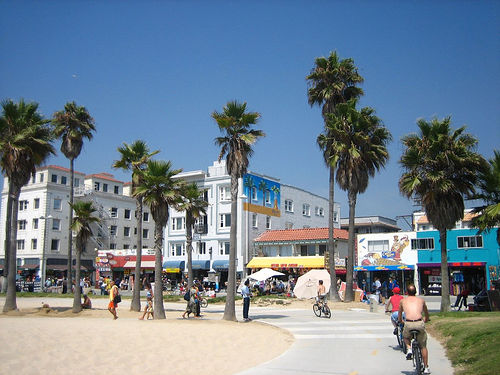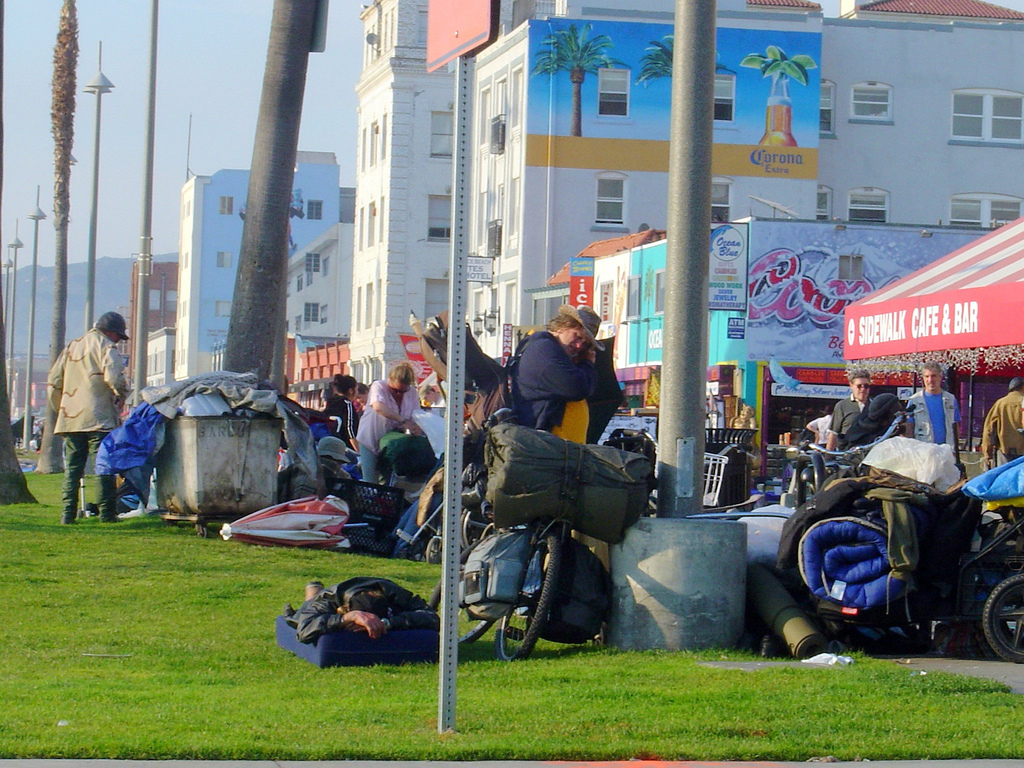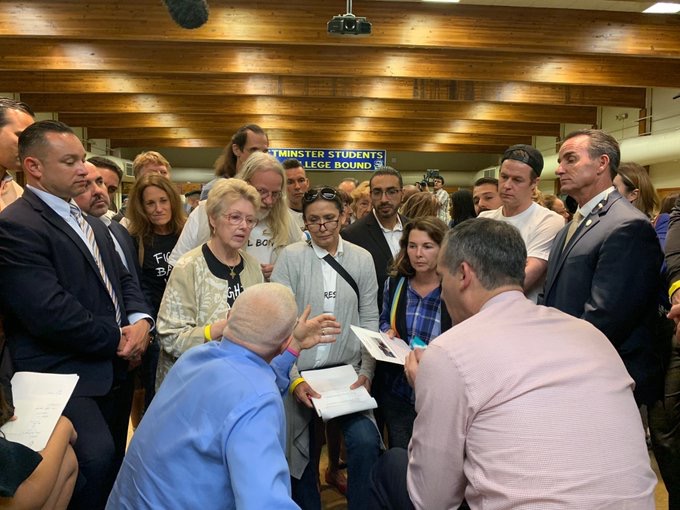
Venice Beach, CA. (Photo: Wikipedia)
The Regulatory Taking of Venice Beach
The Los Angeles City Council appears willing to let these small landlords bleed out
By Edward Ring, May 1, 2020 2:12 am
With great crisis comes great opportunity…
By Edward Ring and Soledad Ursua
On April 18 Los Angeles City Councilman Mike Bonin held a telephone town hall to discuss public health issues. His district includes Venice Beach, which has a high number of homeless still living on the streets, and it was brought up that this is a major health concern. Towards the end of the call Bonin said that he believed that the City would have an opportunity to house the homeless. He said that he will be proposing they use some of the federal stimulus money to buy up distressed hotels and properties to put the homeless in. He said that is the best option because these properties will be in foreclosure and available at below market prices.
“I intend on putting in another proposal in the next week or two that asks the city to look at the federal bailout or stimulus funds we’ll be getting as a result of this crisis…and using some of that to either buy hotels that go belly up or to buy the distressed properties that are absolutely going to be on the market at cheaper prices after this crisis is over. And use that as homeless and affordable housing. It’s going to be a hell of a lot cheaper to purchase stuff that is already there and move people in there than if we start from scratch. A lot of good stuff is being done.”
– Mike Bonin, LA City Council member, 11th District, remarks at 4/18 virtual town hall
The Big Opportunity
Councilman Mike Bonin, who makes over $285,000 per year, led the charge last month to pass a blanket eviction moratorium due to COVID-19, which was passed and signed by the Mayor, and later passed by Los Angeles County Supervisors to cover the entire county. This will shift the burden onto mom and pop landlords who will face losing their properties because without income from tenants they cannot pay their mortgage nor property taxes.
The law stated that as of March 31 there would be an eviction ban, whereby no landlord would be able to evict a tenant for failure to pay rent due to economic hardship caused by the virus. The law also stopped all at-fault and no fault evictions, essentially shutting down the courts and the police power to enforce any judgments.
While the California Legislature’s statewide eviction moratorium asked tenants to provide proof that they were facing an economic hardship directly caused by the pandemic, it also required proof that they could not pay by requiring 3 months of bank statements. The idea was to ensure that only tenants who qualified were able to seek relief. But the Los Angeles City eviction moratorium removed any proof of hardship, instead specifying that a tenant would only need to tell their landlord that they could not pay.
Per the Los Angeles Housing and Community Investment Department website, tenants are instructed as follows: “The L.A. City Ordinance does not require tenants to provide their landlord notice or documentation if unable to pay rent due to COVID-19, but tenants should keep documentation in the event of a court action.”
The ban will last until 90 days following the end of the local crisis, which at the earliest will be May 15. This means that a tenant could stop paying rent on April 1 without any proof of hardship, and a landlord not be able to begin eviction proceedings until August 15. Without any property tax relief given by LA County, small landlords, which are essentially small businesses, were on the hook to pay their 2nd installment of property taxes on April 15, and are now expected to carry 4-6 months without any income.
While the City mandated that federally insured mortgages will provide a mortgage moratorium, that does not protect small landlords since they have private mortgages that are not federally insured. It can take months for a small property owner to work something out with their private mortgage company, if at all. The Los Angeles council members should know very well that many small landlords will not be able to weather this economic storm. Determined to protect only the tenants, but offering nothing to the small landlords, the Los Angeles City Council appears willing to let these small landlords bleed out.
Since imposing eminent domain as a means of forcing urban redevelopment is increasingly considered an abuse of power, a more discreet strategy is to impose a regulatory taking.
It should be emphasized that in communities like Venice Beach, nearly all of the landlords are also homeowners. They typically occupy one of the units in the duplexes or triplexes that they’re sharing with tenants. Therefore when these landlords default on their mortgages and have to sell, they are also being displaced.
But the City’s inaction to protect small landlords is best understood as a big opportunity for the regulatory taking of Venice Beach. The eviction moratorium will force unprecedented mortgage defaults. Once small landlords default on their mortgages and property taxes the City will have the opportunity to jump in to buy them on the cheap, up-zone the properties, and give them away to their developer friends and political donors for free in return for building “affordable housing.”
Never mind that “affordable housing” in California, with both the construction and the subsequent rents subsidized by taxpayers, is going in at an average cost of well over $500,000 per unit, and at that cost will never solve California’s housing shortage or homeless crisis.
Landlord associations such as the Apartment Owners Association are advising small property owners to prepare for a minimum of six months without any income. Even if a landlord has good renters, those renters may eventually realize they are idiots for paying rent when no one else is. Eviction proceedings take six months, and cannot even begin under the new ordinance until August 15 at the earliest. Small landlords are preparing to forfeit rent revenue until mid-February 2021. A lot of them will not last that long.
Private Property Rights
Private property is not only the foundation of American prosperity, but the source of its underlying freedom. The Constitution protects property rights through the Fifth and Fourteenth Amendments’ Due Process Clauses and, more directly, through the Fifth Amendment’s Takings Clause: “nor shall private property be taken for public use without just compensation.”
A taking is when the government seizes private property for public use, which can come in two forms. A government can take property outright through eminent domain. By doing so, the government must pay fair market value to the owner.
Since imposing eminent domain as a means of forcing urban redevelopment is increasingly considered an abuse of power, a more discreet strategy is to impose a regulatory taking. A regulatory taking occurs when the government does not actually seize title outright, but via legislation, whereby it imposes stringent regulation that reduces property value. A regulatory taking of private property is unconstitutional and protected by the 5th amendment takings clause.
California elected officials believe that housing is a universal right and they have been looking to seize private property for some time. This pandemic is their excuse. The State is forcing landlords to avoid displacing nonpaying tenants, without offering compensation to the landlords, fully aware it will cause an epidemic of landlords going bankrupt.
A regulation that prevents landlords from evicting nonpaying tenants, without offering compensation, is a taking. While there may be a moral argument today for protecting renters who cannot pay because of the pandemic, it is immoral and unlawful to transfer this hardship to landlords without offering compensation. To use federal funds instead to swoop in and purchase the properties of bankrupt landlords is conniving and predatory behavior.
Not only does a ban on evictions without just compensation to landlords constitute a taking, it also violates the contracts clause of the U.S. Constitution. Article 1 of the Constitution, otherwise known as the Contracts Clause, says that no State shall pass any law impairing the obligation of private contracts, whether it be between private individuals or between such and private corporations. The original intent of this provision in the constitution was to protect private citizens from despotic powers of the State.
The Los Angeles City Council has passed an eviction moratorium that shuts down any eviction processes in the local courts, and the Los Angeles Sheriffs will not use their police power to evict nonpaying tenants.
Many ominous precedents have been set during the COVID-19 pandemic. Not least among them is this: The City of Los Angeles eviction ban has imposed a regulatory taking of private property, violating the protections offered by the 14th and 5th amendments. At the same time, the eviction ban takes away the legitimate police power and court powers afforded to private citizens, which violates the 14th amendment and the contracts clause.
Councilman Bonin, his colleagues on the Los Angeles City Council, and elected officials responsible for similar measures throughout the state: get ready. There are strong constitutional grounds upon which to successfully challenge these overreaching edicts.
‘No State shall pass any law impairing the obligation of private contracts, whether it be between private individuals or between such and private corporations’
Edward Ring is a senior fellow of the Center for American Greatness. He is a co-founder of the California Policy Center, a free-market think tank based in Southern California, where he served as their first president.
Soledad Ursua is a principal at Orinoco Equities. She is a Los Angeles native, currently living in Venice Beach.
- Ringside: What Will California Gas Prices Do in 2026? - February 19, 2026
- Ringside: Large Scale Desalination Belongs in California’s Water Strategy - February 12, 2026
- Governor Newsom: Turn Up the Delta Pumps! - February 11, 2026





Very grateful to Edward Ring for explaining what our state and local politicians are up to under cover of CV-19 and what is at stake. Without such an explanation there would only be an onslaught of incomprehensible chaotic events that undermine the rights of “mean” property owners who “unfairly” evict and charge rent to tenants, which is what the predatory politicians and their partners in this scheme want.
The California democrats need to be sued in federal court for the above civil rights violations.
Once again the wisdom of the Framers is well-illustrated by the oily actions of local politicians, as is the truth of the adage, “As ye vote, so shall ye receive.”
Thanks to Edward Ring and the California Globe for shining a light on this, and let us hope these measures are, indeed, challenged in court in the loudest and most visible manner possible.
Well stated. Bonin has meddled in changing the nature of Venice with his insistence that the homeless be placed there. Recently the cadallac hotel will be housing the homeless payed for by the county. The owner said he was persuaded by the close proximity to the transient ward on the MTA property which houses a few that want to be incarcerated at that facility. So now the county is also dumping the homeless in Venice. We do not know how many have contracted the virus and little else. Bonin is attacking us making Venice less safe with his permissive position on sanitation and crime. He even tried to change the name of Venice to Silicon Beach in support of his benefactors. to say he wants you out of your property so he can give it to the homeless is a slap in the face. He wants Venice to fail. Beware of his actions because his actions are not in the communities interest.
I don’t think Mike Bonin is Mr. Popularity at the moment.
Looks like he received much more publicity and outraged blowback because of this than he ever imagined he would. Good. I know the residents vehemently fought back, I think for months, against his plan to plop a “bridge shelter” there. Didn’t matter, he did it anyway. Then they find out what his Big Plan actually was. Of course it remains to be seen what will happen now, but I sincerely hope this spotlight makes him think twice about proceeding.
The nation / state of California also has a constitution. It starts with this:
“All people are by nature free and independent and have inalienable rights. Among these are enjoying and defending life and liberty, acquiring, possessing, and protecting property, and pursuing and obtaining safety, happiness, and privacy.”
Why is it never mentioned in discussions of property rights? It also includes provisions precisely analogous to those mentioned in the Federal constitution.
Somehow, our politicians have moved on from just being corrupt, to outright evil.
Yes.
This reminds me of the pre-Revolutionary War days when British soldiers were forcibly domiciled in private homes…
We all know how THAT turned out….
What a load of crap. “Private property is not only the foundation of American prosperity, but the source of its underlying freedom.” Ringo the fake non-profiteer needs to hear in no uncertain terms that our system prioritizes the health and general welfare of We the People over We the Whiny Landlords.
Projection is the “daily driver” tool of weak-minded Trump-loving Republicans – the perverted class singly benefiting from today’s economic conditions – created, by the way, by our Pandemicist-in-Chief, who could easily have contained the outbreak at the outset but chose the passive-aggressive “murder the most oppressed” route.
Winning. Next they’ll be “taking” your illegal short-term rentals whose exploitation created the epidemic of crafty evictions under some fallacious “going out of the rental business” excuse. Good. We’ll be able to house ALL the city’s homeless at the long-delayed expense of the vultures who couldn’t survive for a day in the streets without cheating someone.